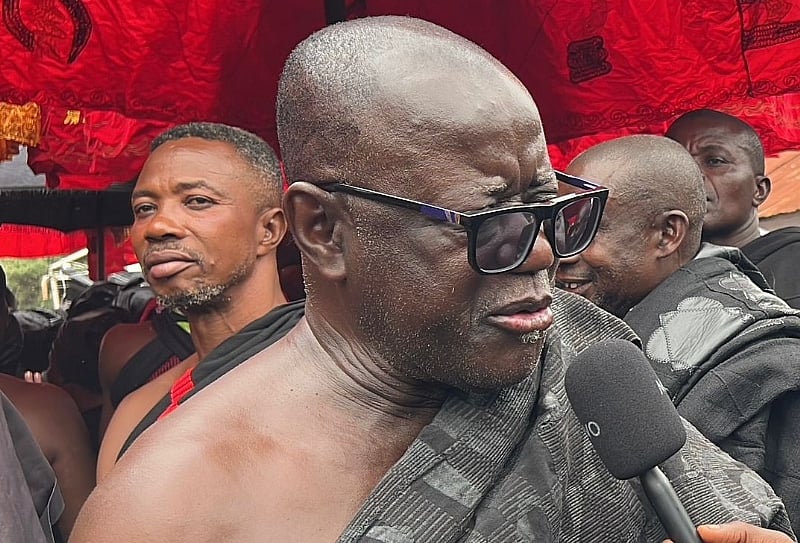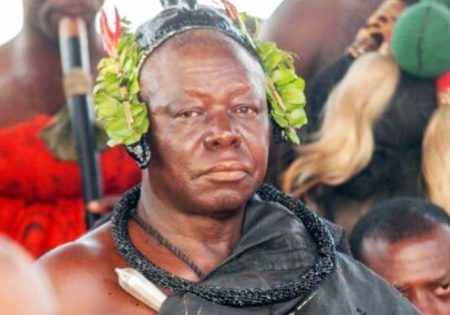The Golden Stool, known as Sikadwa Kofi, stands as the paramount symbol of unity, power, and spiritual authority within the Asante Kingdom of Ghana. Its significance transcends mere material value, representing the very soul of the Asante nation and embodying the collective spirit of its people. Regarded as a divine gift, its history is steeped in rich tradition and mystical origins, firmly placing it at the heart of Asante identity and cultural heritage. Nana Akwasi Kodua Kuoko II, Kyeremfasohene and Head of Protocol for the Mampong Traditional Council, recently issued a stern warning against any form of disrespect or denigration towards this sacred object, underscoring the profound spiritual consequences that could befall those who dare to trivialize its importance.
The creation of the Golden Stool is attributed to the legendary priest and advisor Okomfo Anokye, a figure revered for his wisdom and supernatural abilities. According to Asante belief, the stool miraculously descended from the heavens on a Friday, landing gently on the lap of the first Asantehene, Osei Tutu, in the presence of assembled chiefs. This divine act solidified Osei Tutu’s authority and served as the catalyst for the unification of various Asante states into a single, powerful kingdom. Okomfo Anokye declared the stool to be the repository of the Asante nation’s soul, or “sunsum,” binding the people together under a common identity and purpose. Its existence, therefore, is not considered the result of human craftsmanship, but rather a miraculous event orchestrated through spiritual forces, further reinforcing its sacred status.
Nana Akwasi Kodua’s cautionary statement arises from concerns regarding recent instances where the Golden Stool’s sanctity has been undermined. His emphatic assertion that the stool is “not handmade” emphasizes its supernatural origins and underscores the need for utmost reverence. He stressed that the creation process involved intricate spiritual rituals and pronouncements, investing the stool with immense power that demands respectful treatment. Any act of disrespect, whether intentional or unintentional, is believed to invite spiritual repercussions and curses, not only upon the individual but potentially upon the entire Asante nation. This belief highlights the deep-seated spiritual connection between the Asante people and the Golden Stool.
The Kyeremfasohene’s admonition to exercise caution when discussing spiritual matters, particularly those related to the Golden Stool, reflects the Asante tradition of respecting the unseen forces that govern the world. Certain topics are considered taboo, and approaching them without proper reverence can disrupt the delicate balance between the physical and spiritual realms. This cultural sensitivity extends to all aspects of Asante life, and the Golden Stool, as the ultimate symbol of their spiritual identity, is particularly enveloped in such protocols. The “dos and don’ts” surrounding its discussion and handling are strictly observed to maintain its sanctity and prevent any spiritual harm.
The Golden Stool’s significance extends beyond its spiritual dimension. It serves as a potent symbol of Asante unity and sovereignty, representing the collective strength and shared destiny of the Asante people. It is the embodiment of their political authority, and historically, all allegiance was sworn to it, solidifying the Asantehene’s rule and ensuring the cohesion of the kingdom. The stool is so revered that it is rarely seen in public, kept hidden and protected except on exceptionally important occasions. Its physical presence is a testament to the enduring legacy of the Asante kingdom and a tangible reminder of its powerful history.
The Mampong Traditional Council, responsible for overseeing significant areas within the Asante Kingdom, including Ejura and Jamasi, plays a vital role in preserving and upholding Asante traditions and heritage. Nana Akwasi Kodua’s warning serves as a powerful reminder of this responsibility, demonstrating the Council’s commitment to protecting the sanctity of the Golden Stool and the spiritual well-being of the Asante people. This vigilance ensures that future generations continue to understand and appreciate the profound significance of this sacred object, ensuring its continued reverence and the preservation of Asante cultural identity. Under the leadership of Otumfuo Osei Tutu II, the current Asantehene, the legacy of the Golden Stool continues to be honored and protected, ensuring its enduring power as a symbol of unity, authority, and spiritual identity for the Asante nation.














